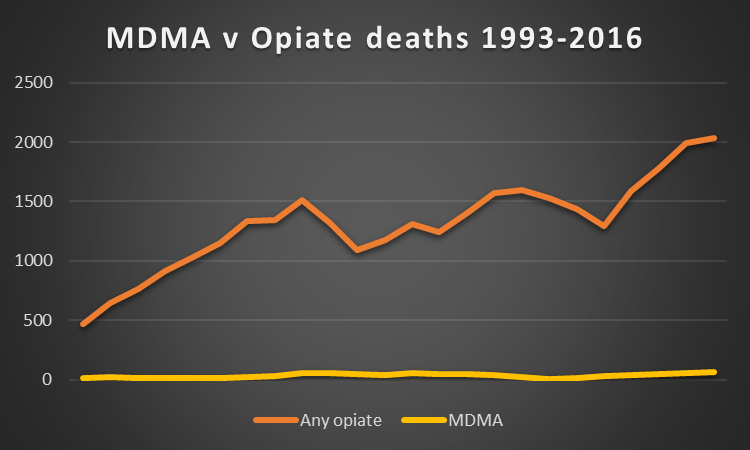We already know how to stop people dying from drugs – but the Government refuses to do it
Fewer people are using drugs, but more people are dying than ever


Last year saw the highest number of drug-related deaths since records began in 1993. More than half of these deaths involved an opiate, such as heroin. Those aged 40 to 49 made up the largest group dying as a result of drug poisoning. Compared with the general population, this group is dying decades before they should.
Are some deaths more “newsworthy” than others?
Historically, there has been disproportionate attention paid to deaths attributed to MDMA (usually sold as ecstasy). MDMA deaths have increased from 57 to 63, the highest ever number, but these deaths are deemed newsworthy because they are still rare, considering how many people take ecstasy each year.

However, while ecstasy deaths are atypical in relation to the overall burden of drug-related deaths, one analysis of Scottish newspaper reports in the 1990s showed that although all ecstasy deaths made the headlines, only one in nine opiate deaths (and one in 130,000 tobacco deaths) were reported. This discrepancy is probably still evident and is important because reports of deaths are often used as a platform to advocate for change in policy and practice. While we have seen a welcome media focus over the summer on harm-reduction strategies, such as drug checking at clubs and festivals, there has been a lack of equivalent focus on opiate deaths, perhaps because of who typically uses opiates compared with who uses ecstasy.
Why are people dying?
It is difficult to know what impact austerity has had in shortening the lives of people who use drugs. But is it a coincidence that since the change in policy in 2010, which saw a move from trying to reduce the harm that drugs cause to one that promoted abstinence, more people have lost their lives?

It is unlikely that a single factor explains this rise in deaths. Rather a constellation of elements. We have an ageing cohort of opiate users who are developing physical problems. Variability in the purity of heroin will also be a contributing factor. Being in treatment reduces the risk of overdose and death but there are variations in treatment. Ensuring patients receive the right dose of an opiate substitute for long enough is one area we could improve as that has been shown to reduce mortality.
Drug consumption rooms
It is encouraging that the Government has made commitments to support high quality methadone-based drug treatment, and the wider use of naloxone, a drug used to reverse the effects of an opiate overdose. Ninety per cent of local authorities report that they have made take-home naloxone kits available to drug users, with the remaining reporting that local drug deaths were too low to warrant introduction, which is a concern as they shouldn’t wait until people die before making these life-saving kits available.
However, in a 2016 report to the Government, the Advisory Council on the Misuse of Drugs made a number of additional recommendations to reduce opiate deaths, including the introduction of medically supervised drug consumption facilities. The recent European Union action plan on drugs has also encouraged member states to adopt this approach. Unfortunately, the Government has replied that it has no plans to act on this particular advice. While it has stated that it is up to local areas to determine how to respond to drug user’s needs, the reality is that without central Government support and funding, local authorities are unlikely to introduce these potentially life-saving measures on their own.
So with fewer people using drugs but more people dying than ever, there is an urgent need for action. The Government must act quickly, drug consumption rooms will save lives, that would be the right thing to do even if it won’t win votes.
Ian Hamilton is a lecturer at the University of York and Harry Sumnall is a professor at Liverpool John Moores University
Join our commenting forum
Join thought-provoking conversations, follow other Independent readers and see their replies
Comments
Bookmark popover
Removed from bookmarks